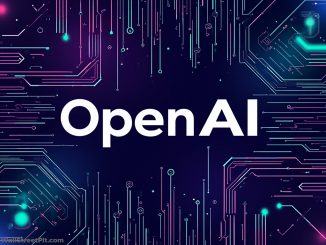In a recent appearance on CNBC’s ‘Squawk on the Street,’ OpenAI’s Chief Product Officer Kevin Weil, alongside CNBC’s Kate Rooney, discussed the company’s latest technological strides and strategic initiatives, particularly in light of the emerging competition from China’s DeepSeek AI.
Weil shared that OpenAI has been actively engaging with policymakers in Washington DC, emphasizing their commitment to evolving AI technology in a way that benefits both individuals and the national economy. He highlighted the transition of AI from merely answering questions to performing tasks in the real world, mentioning the launch of OpenAI’s new product, Operator, which automates web-based tasks like ordering groceries or filling out forms. This shift towards AI agents, he explained, is set to define 2025, with more agentic products on the horizon.
Addressing the significant issue of DeepSeek, Weil acknowledged the competitive threat while expressing concerns about intellectual property and the broader implications for U.S.-China tech rivalry. He underscored the importance of building AI that aligns with democratic values, contrasting this with potential authoritarian approaches from China. Despite the IP disputes, Weil’s focus remained on advancing OpenAI’s technology, stating that their upcoming models would significantly surpass current benchmarks.
The conversation also touched on OpenAI’s substantial financial commitments, including a $500 billion project named Stargate, aimed at bolstering U.S. energy, infrastructure, and chip production. This initiative, announced in collaboration with President Trump and tech leaders like SoftBank’s Masayoshi Son and Oracle’s (ORCL) Larry Ellison, is part of OpenAI’s broader strategy to secure the necessary computational resources for leading AI development.
On the topic of government partnerships, Weil discussed the launch of ChatGPT Gov, tailored specifically for U.S. government agencies with strict compliance and security measures. He also mentioned new collaborations with national labs, like Los Alamos and Lawrence Livermore, to aid in advanced scientific research and national security.
When questioned about export controls and semiconductors, Weil advocated for tighter controls to limit China’s access to critical technology, reinforcing the need for the U.S. to invest heavily in its tech infrastructure to maintain a lead in AI innovation.
Regarding potential fundraising, Weil confirmed the ongoing partnership with SoftBank without detailing specifics but praised their visionary alignment with OpenAI’s goals.
Lastly, on the topic of open-source AI models like those from DeepSeek, Weil emphasized OpenAI’s dual strategy of pushing the boundaries of AI research while simultaneously developing user-centric products. This approach, he believes, will help maintain OpenAI’s competitive edge by not only advancing the technology but also by ensuring it’s integrated into products that add real value to users’ lives.
Through this discussion, Weil painted a picture of a tech landscape where innovation, national security, and economic strategy are deeply intertwined, with OpenAI positioning itself at the forefront of this global AI race.
WallStreetPit does not provide investment advice. All rights reserved.
- Bulenox: Get 45% to 91% OFF ... Use Discount Code: UNO
- Risk Our Money Not Yours | Get 50% to 90% OFF ... Use Discount Code: MMBVBKSM
Disclaimer: This page contains affiliate links. If you choose to make a purchase after clicking a link, we may receive a commission at no additional cost to you. Thank you for your support!





Leave a Reply